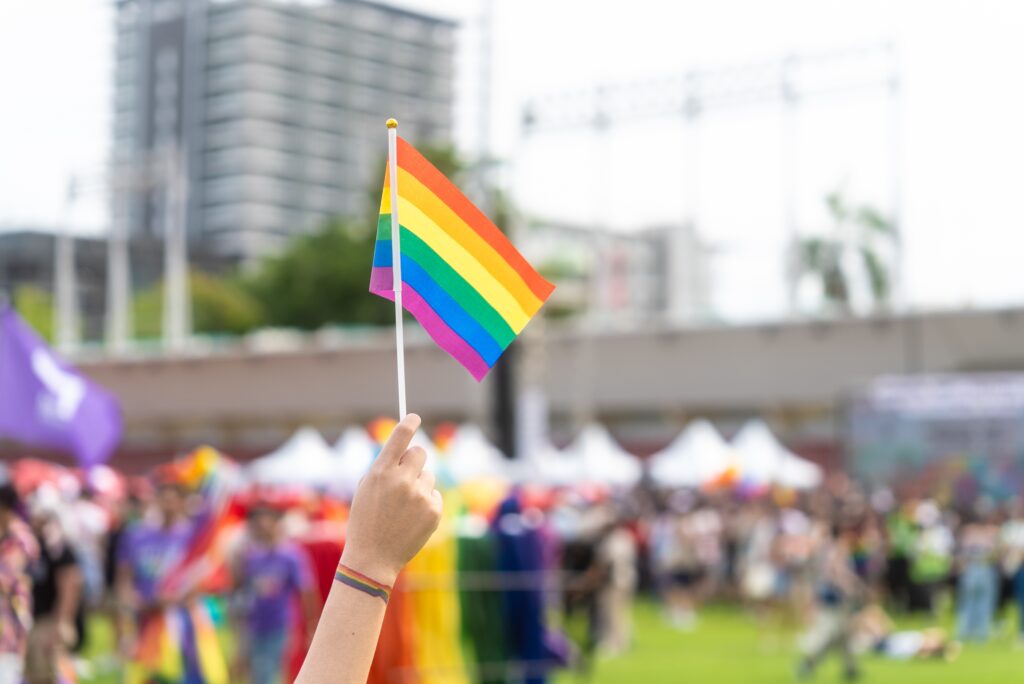LGBTQ+ rights in Germany: Thousands of people in Germany took to the streets, waving rainbow flags and holding signs that read “Choose Love.” These rallies were held in 50 cities, just days before a key election. The far-right Alternative für Deutschland (AfD) is projected to become the second-largest party. LGBTQ+ groups organized the protests to show strength amid rising fears of discrimination.
Growing Concerns About Anti-LGBTQ+ Rhetoric
LGBTQ+ activists in Germany are worried about a shift in politics. They say anti-LGBTQ+ and anti-trans messages are becoming more common. Organizers of the protests said that many queer people feel uneasy. “The tone against us is getting harsher, and democracy is under threat,” they stated.
The far-right AfD has long opposed LGBTQ+ rights. They have spoken out against marriage equality, safe spaces for LGBTQ+ people, and healthcare for transgender individuals. The AfD defines family as a unit of “father, mother, and children.” This excludes many types of families. They also want to protect minors from what they call the “trans cult” and “gender ideology.”
With polls showing the AfD could double its support, LGBTQ+ communities fear more discrimination. In 2023, at least 26 Pride events were attacked by far-right protesters. Alva Träbert from the LGBTQ+ group LSVD warned, “Violence starts with words, and words lead to actions.”
AfD’s Influence Grows – LGBTQ+ rights in Germany
The AfD’s influence is growing in Germany. This has caused concern within mainstream parties. CDU-CSU leader Friedrich Merz has said he won’t work with the AfD. However, he recently supported the AfD on a border policy, breaking a political taboo.
Both the CDU-CSU and AfD want to repeal Germany’s self-determination law. This law lets transgender and non-binary people change their gender and name on official documents. Many see this as a direct threat to the rights of transgender, non-binary, and intersex people.
Träbert expressed concern about the repeal, saying, “This is a serious threat to trans, non-binary, and intersex people.” Repealing the law could undo progress for these communities. It would also make their lives harder.
Alice Weidel: A Divisive Figure
One of the most talked-about figures in the AfD is Alice Weidel. Weidel is the party’s candidate for chancellor. She is a lesbian woman who is raising two children with her wife. But her personal story does not align with the AfD’s policies.
Political scientist Constantin Wurthmann said Weidel is a “fig leaf” for the party. He explained, “If you say the AfD is racist, they point to Weidel’s partner. If you say they are homophobic, they highlight Weidel as a lesbian leader. But she does not represent the LGBTQ+ community’s values.”
Despite her personal identity, Weidel has allied herself with people who have anti-LGBTQ+ views. She has supported figures like Elon Musk and Viktor Orbán. Orbán is the Prime Minister of Hungary, where anti-LGBTQ+ laws are in place. During a visit to Budapest, Hungary’s Labrisz Lesbian Association questioned Weidel’s alliance with Orbán. They asked, “What message are you sending to Hungarian lesbians with your visit?”
AfD’s Contradictory Stance
The AfD’s position on LGBTQ+ issues is at odds with Weidel’s personal life. While the party pushes policies that harm LGBTQ+ rights, Weidel’s identity challenges their narrative. A senior AfD official once said, “She is just gay by biology, but not by political conviction.” This highlights the contradictions within the AfD.
Weidel’s actions, however, seem to show support for anti-LGBTQ+ views. She has met with Musk and Orbán, both of whom are seen as opponents of LGBTQ+ rights. This has caused many to question her commitment to the LGBTQ+ community, despite her personal identity.
A Divided Political Landscape
The political situation in Germany is growing more divided. With the AfD gaining support, LGBTQ+ activists are becoming more concerned. They fear that the party’s rise could lead to setbacks for LGBTQ+ rights.
The upcoming election will be a key moment. The question is whether the AfD will continue to grow and what this will mean for LGBTQ+ rights in the country. As tensions rise, it’s clear that the fight for LGBTQ+ equality in Germany is far from over.
For more on this story, visit Euro News 24.
